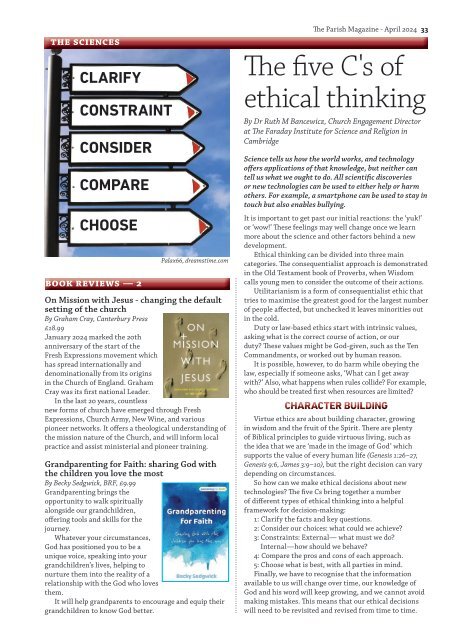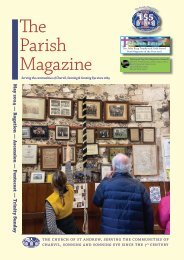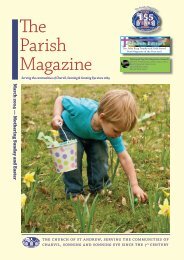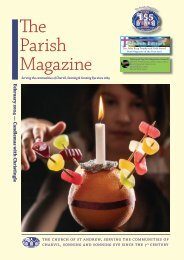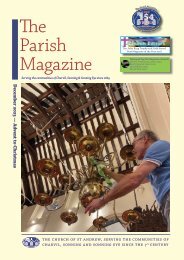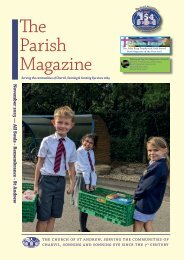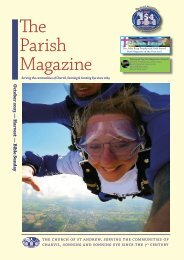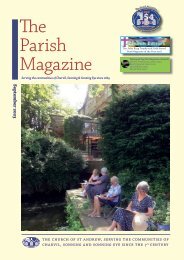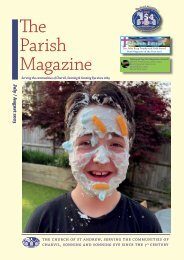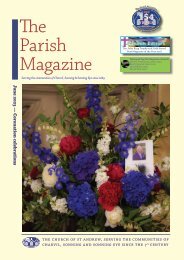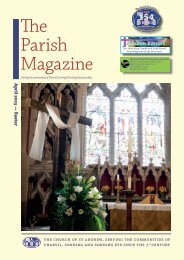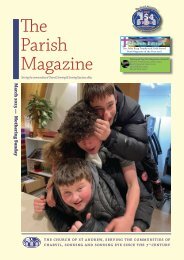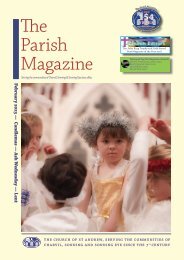The Parish Magazine April 2024
Serving the communities of Charvil, Sonning, and Sonning Eye since 1869
Serving the communities of Charvil, Sonning, and Sonning Eye since 1869
Create successful ePaper yourself
Turn your PDF publications into a flip-book with our unique Google optimized e-Paper software.
THE SCIENCES<br />
CLARIFY<br />
CONSTRAINT<br />
CONSIDER<br />
COMPARE<br />
CHOOSE<br />
BOOK REVIEWS — 2<br />
Palax66, dreamstime.com<br />
On Mission with Jesus - changing the default<br />
setting of the church<br />
By Graham Cray, Canterbury Press<br />
£18.99<br />
January <strong>2024</strong> marked the 20th<br />
anniversary of the start of the<br />
Fresh Expressions movement which<br />
has spread internationally and<br />
denominationally from its origins<br />
in the Church of England. Graham<br />
Cray was its first national Leader.<br />
In the last 20 years, countless<br />
new forms of church have emerged through Fresh<br />
Expressions, Church Army, New Wine, and various<br />
pioneer networks. It offers a theological understanding of<br />
the mission nature of the Church, and will inform local<br />
practice and assist ministerial and pioneer training.<br />
Grandparenting for Faith: sharing God with<br />
the children you love the most<br />
By Becky Sedgwick, BRF, £9.99<br />
Grandparenting brings the<br />
opportunity to walk spiritually<br />
alongside our grandchildren,<br />
offering tools and skills for the<br />
journey.<br />
Whatever your circumstances,<br />
God has positioned you to be a<br />
unique voice, speaking into your<br />
grandchildren’s lives, helping to<br />
nurture them into the reality of a<br />
relationship with the God who loves<br />
them.<br />
It will help grandparents to encourage and equip their<br />
grandchildren to know God better.<br />
<strong>The</strong> <strong>Parish</strong> <strong>Magazine</strong> - <strong>April</strong> <strong>2024</strong> 33<br />
<strong>The</strong> five C's of<br />
ethical thinking<br />
By Dr Ruth M Bancewicz, Church Engagement Director<br />
at <strong>The</strong> Faraday Institute for Science and Religion in<br />
Cambridge<br />
Science tells us how the world works, and technology<br />
offers applications of that knowledge, but neither can<br />
tell us what we ought to do. All scientific discoveries<br />
or new technologies can be used to either help or harm<br />
others. For example, a smartphone can be used to stay in<br />
touch but also enables bullying.<br />
It is important to get past our initial reactions: the ‘yuk!’<br />
or ‘wow!’ <strong>The</strong>se feelings may well change once we learn<br />
more about the science and other factors behind a new<br />
development.<br />
Ethical thinking can be divided into three main<br />
categories. <strong>The</strong> consequentialist approach is demonstrated<br />
in the Old Testament book of Proverbs, when Wisdom<br />
calls young men to consider the outcome of their actions.<br />
Utilitarianism is a form of consequentialist ethic that<br />
tries to maximise the greatest good for the largest number<br />
of people affected, but unchecked it leaves minorities out<br />
in the cold.<br />
Duty or law-based ethics start with intrinsic values,<br />
asking what is the correct course of action, or our<br />
duty? <strong>The</strong>se values might be God-given, such as the Ten<br />
Commandments, or worked out by human reason.<br />
It is possible, however, to do harm while obeying the<br />
law, especially if someone asks, ‘What can I get away<br />
with?’ Also, what happens when rules collide? For example,<br />
who should be treated first when resources are limited?<br />
CHARACTER BUILDING<br />
Virtue ethics are about building character, growing<br />
in wisdom and the fruit of the Spirit. <strong>The</strong>re are plenty<br />
of Biblical principles to guide virtuous living, such as<br />
the idea that we are ‘made in the image of God’ which<br />
supports the value of every human life (Genesis 1:26–27,<br />
Genesis 9:6, James 3:9–10), but the right decision can vary<br />
depending on circumstances.<br />
So how can we make ethical decisions about new<br />
technologies? <strong>The</strong> five Cs bring together a number<br />
of different types of ethical thinking into a helpful<br />
framework for decision-making:<br />
1: Clarify the facts and key questions.<br />
2: Consider our choices: what could we achieve?<br />
3: Constraints: External— what must we do?<br />
Internal—how should we behave?<br />
4: Compare the pros and cons of each approach.<br />
5: Choose what is best, with all parties in mind.<br />
Finally, we have to recognise that the information<br />
available to us will change over time, our knowledge of<br />
God and his word will keep growing, and we cannot avoid<br />
making mistakes. This means that our ethical decisions<br />
will need to be revisited and revised from time to time.


